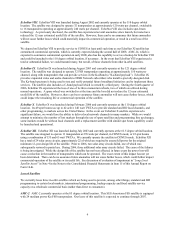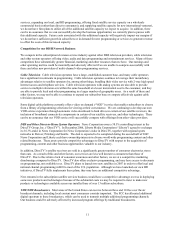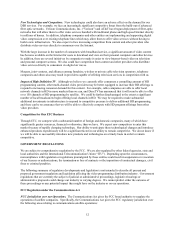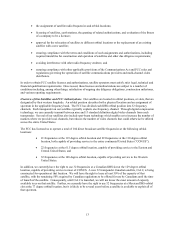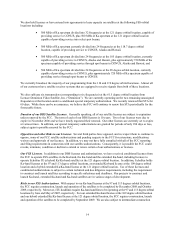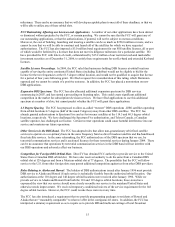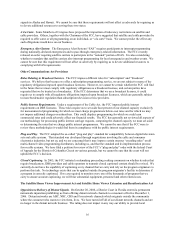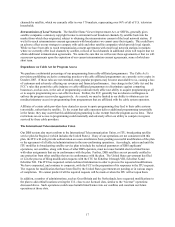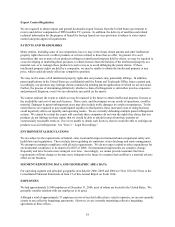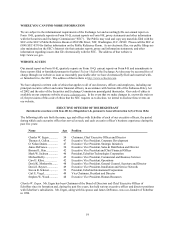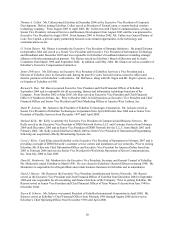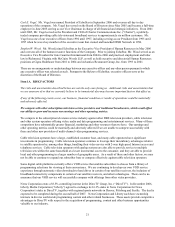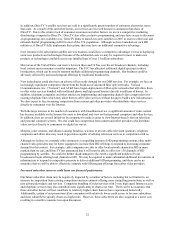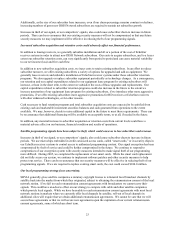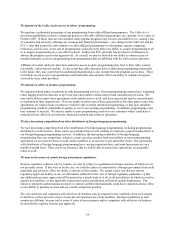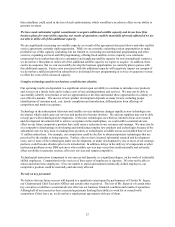Dish Network 2006 Annual Report Download - page 27
Download and view the complete annual report
Please find page 27 of the 2006 Dish Network annual report below. You can navigate through the pages in the report by either clicking on the pages listed below, or by using the keyword search tool below to find specific information within the annual report.17
channels by satellite, which we currently offer in over 170 markets, representing over 96% of all of U.S. television
households.
Retransmission of Local Networks. The Satellite Home Viewer Improvement Act, or SHVIA, generally gives
satellite companies a statutory copyright license to retransmit local broadcast channels by satellite back into the
market from which they originated, subject to obtaining the retransmission consent of the local network station. If
we fail to reach retransmission consent agreements with broadcasters we cannot carry their signals. This could have
an adverse effect on our strategy to compete with cable and other satellite companies which provide local signals.
While we have been able to reach retransmission consent agreements with most local network stations in markets
where we currently offer local channels by satellite, roll-out of local channels in additional cities will require that we
obtain additional retransmission agreements. We cannot be sure that we will secure these agreements or that we will
secure new agreements upon the expiration of our current retransmission consent agreements, some of which are
short term.
Dependence on Cable Act for Program Access
We purchase a substantial percentage of our programming from cable-affiliated programmers. The Cable Act’s
provisions prohibiting exclusive contracting practices with cable affiliated programmers are currently set to expire in
October 2007. If those rules are not extended, many popular programs may become unavailable to us, causing a loss
of customers and adversely affecting our revenues and financial performance. Any change in the Cable Act and the
FCC’s rules that permit the cable industry or cable-affiliated programmers to discriminate against competing
businesses, such as ours, in the sale of programming could adversely affect our ability to acquire programming at all
or to acquire programming on a cost-effective basis. Further, the FCC generally has not shown a willingness to
enforce the program access rules aggressively. As a result, we may be limited in our ability to obtain access (or
nondiscriminatory access) to programming from programmers that are affiliated with the cable system operators.
Affiliates of certain cable providers have denied us access to sports programming they feed to their cable systems
terrestrially, rather than by satellite. To the extent that cable operators deliver additional programming terrestrially
in the future, they may assert that this additional programming is also exempt from the program access laws. These
restrictions on our access to programming could materially and adversely affect our ability to compete in regions
serviced by these cable providers.
The International Telecommunication Union
Our DBS system also must conform to the International Telecommunication Union, or ITU, broadcasting satellite
service plan for Region 2 (which includes the United States). If any of our operations are not consistent with this
plan, the ITU will only provide authorization on a non-interference basis pending successful modification of the plan
or the agreement of all affected administrations to the non-conforming operations. Accordingly, unless and until the
ITU modifies its broadcasting satellite service plan to include the technical parameters of DBS applicants’
operations, our satellites, along with those of other DBS operators, must not cause harmful electrical interference
with other assignments that are in conformance with the plan. Further, DBS satellites are not presently entitled to
any protection from other satellites that are in conformance with the plan. The United States government has filed
or is in the process of filing modification requests with the ITU for EchoStar I through VIII, EchoStar X and
EchoStar XII. The ITU has requested certain technical information in order to process the requested modifications.
We have cooperated, and continue to cooperate, with the FCC in the preparation of its responses to the ITU requests.
The requests for modification that have been filed by the United States government are pending or in various stages
of completion. We cannot predict if all the required requests will be made or when the ITU will act upon them.
In addition, a number of administrations, such as Great Britain and the Netherlands, have requested modifications to
the plan to add orbital locations serving the U.S. close to our licensed slots, similar to the “tweener” operations
discussed above. Such operations could cause harmful interference into our satellites and constrain our future
operations at those slots.




